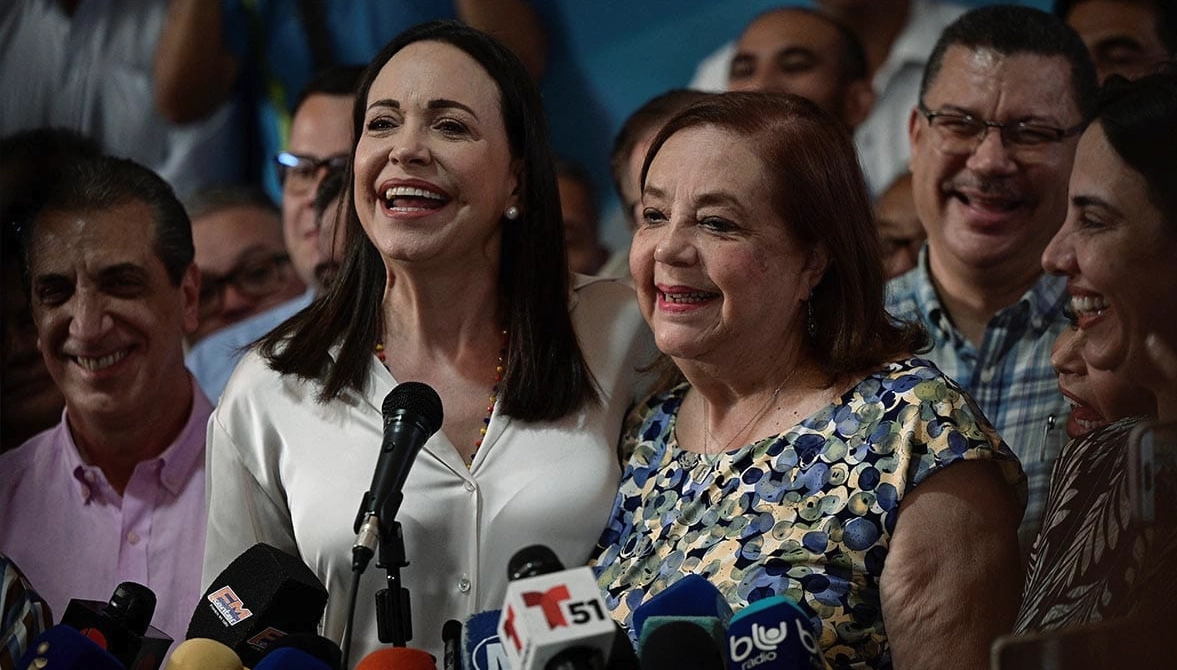Recently, the international community has witnessed the violation of political rights in Venezuela during the process of registration of candidacies for the presidential election, set for July 28, 2024, by the National Electoral Council (CNE).
This date is loaded with symbolism for Chavism. It is the birthday of Hugo Chávez Frías and the intention is to connect with his followers. Given the rejection of Nicolás Maduro among moderate Chavistas who — continue to evaluate the Commander positively, but question his successor due to the socioeconomic situation, the deficiency of public services, and the lack of guarantees for the exercise of social rights: to health, quality education, a decent salary, among others —, emotions are appealed to.
The holding of presidential elections in the second semester of 2024 is part of the commitments established in the Barbados Agreement, signed between the government of the Bolivarian Republic of Venezuela and the opposition, represented in the Unitary Platform of Venezuela. There it was expressly included in the first commitment “the right of each political actor to select its candidate for the presidential election and according to its internal mechanisms, following the provisions of the Constitution of the Bolivarian Republic of Venezuela and the law”. This was the minimum guarantee demanded by the opposition.
María Corina Machado Parisca
In this context, the primaries of the Unitary Platform were held on October 22, 202, for the selection of a unity candidacy in which, María Corina Machado Parisca, self-defined as a liberal, of the Vente Venezuela Party, won with more than 90% of the votes. Machado represents the most radical and right wing of the Venezuelan opposition, some call her the “Venezuelan Iron Lady”, reminiscent of Prime Minister Margaret Thatcher with whom she shares certain approaches, among them, the reduction of the state and economic liberalism.
Machado has been in public and political spaces for more than twenty years, first in the organization Súmate and since 2012 with her party’s foundation. Until her election, she had been characterized for refusing to maintain dialogues with the government and for having public differences with most opposition leaders. These traits are positively evaluated by a part of the population that sees her as the only alternative to get out of the current government. For another part, her stubbornness, and intransigence may be an obstacle to an eventual political transition.
At first, her support came mainly from the elites and the wealthiest Venezuelans abroad. Still, in recent times she has managed to connect with a part of the popular sectors that see her as the only alternative to get out of the current situation.
It should be noted, however, that the fall in popularity of the regime is of such magnitude that, according to different pollsters, any candidate, and not only María Corina, would obtain more votes than Nicolás Maduro. Of course, in a free and competitive election in which the electoral results would be respected.
One of the most remembered anecdotes of María Corina was her confrontation with Chávez in the National Assembly on January 14, 2012. After a speech of the President that lasted more than 9 hours, Machado, who at that time was a Deputy, took the floor and rebuked him for not paying the people he had expropriated. She pointed out that “to expropriate is to steal”, which caused great annoyance to Chavez who answered: “You have called me a thief in public, but I will not answer you because an eagle does not hunt flies, you are not at my level to talk to me, if you win the primaries we will debate”.
The reactions were not long in coming. From the government side, they mocked María Corina and said that Chávez had humiliated her. There was no lack of memes and comments loaded with violence for being a woman and occupying political spaces. From the opposition side, too. With comments loaded with stereotypes, it was pointed out that she was the only one who dared to tell Chavez the truth to his face.
Violence against women who occupy political spaces in Venezuela is a constant that unquestionably affects María Corina Machado as she is currently the most visible leader, but has been directed against other women of the opposition, as is the case of Delsa Solórzano. Chavistas have also suffered. One of those who has been the target of this type of aggression is Delcy Rodriguez. Also, Cilia Flores and the youngest daughter of Hugo Chavez, Rosa Ines, who was appointed president of the National Institute of Parks (Inparques). This violence may be directed against one woman, but the message is for all: political spaces are not for women.
The last one to be assaulted for occupying political and electoral spaces, for being a woman and for her age, has been the academic Corina Yoris-Villasana.
The other Corina
Being elected candidate of the unity did not assure María Corina Machado that she could register before the CNE as she was disqualified from holding public office for 15 years. She is not the only one in the opposition who has been disqualified by the regime, on the contrary, it has been a constant strategy against adversaries who have been considered dangerous. This time, despite the pressure due to the signature of the Barbados Agreements, the situation did not change and Machado could not register.
After long negotiations among the parties that make up the Unitary Platform, on Saturday, March 23, María Corina Machado presented the person who had been designated to replace her: Corina Yoris-Villasana.
Yoris-Villasana is an 80-year-old academic, philosopher, and Bachelor of Arts, with a master’s degree in Latin American Literature and a doctorate in History. She is a full member of the Venezuelan Academy of Language, occupying the seat previously held by Eduardo Blanco, Vallenilla Lanz, and Rómulo Gallegos. Reactions were not long in coming. The doctor awakened the interest of the population and some considered it positive that she was not a traditional politician, others emphasized her credentials, but there was no shortage of comments loaded with violence because she is a woman and an octogenarian.
Corina Yoris-Villasana was not subject to one of the most used clichés to disqualify women who participate in political spaces: the lack of academic preparation, but among detractors and defenders, much importance was given to her age, the fact of being a grandmother, even her way of dressing, which does not happen with men. In Venezuela, several septuagenarian and octogenarian male leaders are questioned for different reasons, but not because of their age as in this case.
Despite all efforts, the regime did not allow the registration of the candidate designated by María Corina Machado. Only after the established time limit, the candidacy of Edmundo González Urrutia was registered for the Mesa de la Unidad Democrática (MUD), in order not to lose the card and thinking of the possibility of changing it before April 20, the deadline to do so.
For now, María Corina insists that her candidate is Corina Yoris-Villasana, even though she is not registered, which affects the necessary unity to face an autocracy in which it is clear that the conditions are not given for extremist positions, but that there must be a disposition for dialogue and negotiation. That is part of politics, to do what you can with what you has, without forgetting the weapons of the contender.
There is no clarity as to what will happen in the following months of this electoral contest; the regime will intensify and impose more obstacles. What should be present is that abstention is not an alternative and that women will not be merely decorative figures in the decisions to be taken.
*Translated by Janaína Ruviaro da Silva from the original in Spanish.













